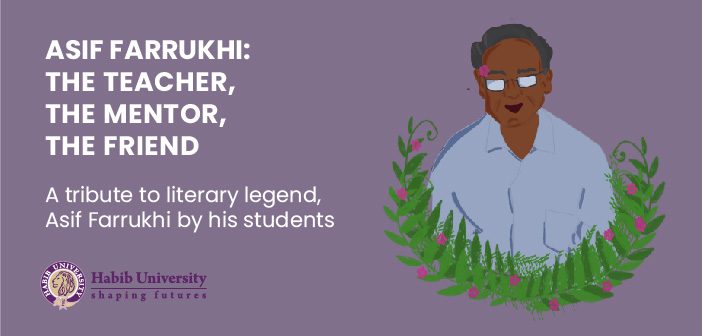A Tribute To Literary Legend, Asif Farrukhi, By His Students:
The first time you hear the news as colossally grave as learning that one of our very own literary heroes has ceased to exist amongst us- it’s mind-numbing. How are you supposed to process that piece of information that landed too abruptly, unexpectedly, and completely heedlessly? How do you write a eulogy for someone who was larger than life, a walking embodiment of culture, kindness, and profound knowledge? Someone who walked around with scintillating stars in his magnificent brownish green eyes and sincerely solicitous words always ready at the tip of his tongue? Someone who impacted hundreds of lives by passing over the love for things that makes us feel most alive in times when nothing else did? How are we supposed to sit there, before our screens, in a very quarantined and quiet world, and push ourselves to make sense of the reality- a reality so doleful, the one in which Asif Sahab exists no more?
Asif Aslam Farrukhi- or how his students and colleagues would call him Asif Sahab- passed away on June 1st, 2020, leaving behind a gigantic legacy and sundry of people to mourn. It’s hard to characterize Asif Sahab in a few attributes. He was one of those brilliant literary intellectuals that are born once in a while. His humility and gingerly curated tender affection and his incessant need to extend his empathy towards his students made him something of a hero amongst them. He was capable of withdrawing the distance between himself and his students just by his raw exhibition of vulnerability, witty sensibilities, and giving equal importance to each and every opinion- even when their opinions did not align with his own. He would unanticipatedly point at anyone in class and say, “Han bhai, tum batao. Tum kia kehna chatey/chati hou is per” and if you didn’t have your answer ready, he would always come back to you later, listen to you, and appreciate you for your input- however, big or small.
Asif Sahab had many talents that many people talked about over the past couple of days but one of his talents consisted of knowing what lengths his students are capable of achieving and he would push them gently- never bullying- in a way that it would make them feel the need to do and be better. He had myriad accomplishments attached to his name yet he would never hesitate to sit and learn from his students, to value their unique take on things that many people have already written and spoken about and Asif Sahab was always generous with paying homage to anyone who sincerely made any effort at all.
Grief is taking time to settle in. It will take a long time to adapt ourselves to live in a world where Asif Sahab doesn’t exist. Where his little private jokes with each of his students will perish with time. Where he won’t be seen sauntering around the corridors of Habib University- passing cordial smiles and genuine conversations that would always go beyond a plain, “How are yous.” Where he won’t be sitting at the very front of the cafeteria with dear Afzal Sahab and Inaam Sahab, inviting anyone within ear-shot to have a very random, but always a remarkable exchange of words and giggles. A world that is devoid of Asif Sahab’s sheer empathy towards humankind. Where the unimaginable amount of people will stay oblivious to the gut-wrenching but equally powerful stories of partition because no one can recount them the way Asif Sahab did.
Those who knew Asif Sahab know one thing- as much as he loved traditional and modern literature, it was always Mir Taqi Mir’s father’s words that he would often quote fervently in class. He would ask everyone to pull out a paper and write a detailed Khath (letter) to their fathers in Urdu on these words: Zindagi mai kuch karo na karo, ishq zarur karna.
Asif Sahab is not amongst us anymore to push us further to contemplate over these words but when we will find our spirits reviving again and our minds being capable of some other exertion than that of the heightening of affliction by melancholy remembrances of him, let’s always remember him by pondering over these words and implementing them in our lives.
Rest in Power, Asif Sahab.
–
Credits: Pride Press HU (https://www.facebook.com/pridepresshu)
Artwork by: Zainab Rizvi (zainab.rizvi_)
Eulogy by: Eesha
Voice-over by: Roha Ali Khan




